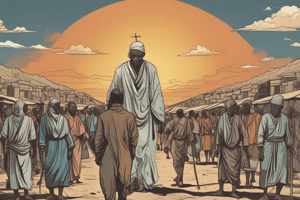Podcast
Questions and Answers
What does the term 'middle class' seem to reflect according to those who accept the label?
What does the term 'middle class' seem to reflect according to those who accept the label?
- The social location of claimants (correct)
- The ability to save money
- Luxury and wealth
- A strict economic status
What is NOT mentioned as a characteristic of the middle class in the quotes provided?
What is NOT mentioned as a characteristic of the middle class in the quotes provided?
- Wearing branded clothing
- Waiting until month end
- Getting all the basics of life
- Owning property (correct)
How many people participated in the 2006 Soweto survey?
How many people participated in the 2006 Soweto survey?
- 2559 (correct)
- 2556
- 2558
- 2560
Which section of the paper discusses the anecdote of two women in Soweto?
Which section of the paper discusses the anecdote of two women in Soweto?
What type of paper is described in the given text?
What type of paper is described in the given text?
Which job role does the individual with a frayed collar shirt hold?
Which job role does the individual with a frayed collar shirt hold?
What can the two young men wearing branded clothing afford to do?
What can the two young men wearing branded clothing afford to do?
Which township is the focus of the 2006 survey?
Which township is the focus of the 2006 survey?
Which of the following best describes the earning status of the sales worker?
Which of the following best describes the earning status of the sales worker?
What does the paper aim to focus on?
What does the paper aim to focus on?
Study Notes
Middle Class Identity in Soweto, South Africa
- The concept of middle class has multiple meanings and purposes, reflecting the social location of those who identify as middle class. This ambiguity is further complicated by the fact that middle-class individuals often subscribe to different values, lifestyles, and aspirations. For instance, some may prioritize economic security, while others may emphasize social mobility, education, or cultural refinement.
- A 2006 survey of 2559 people in Soweto, South Africa's largest township, found that a diverse range of people identify as middle class. This diversity is reflective of the complex socio-economic landscape of Soweto, where people from different backgrounds, occupations, and income levels coexist and interact.
Defining Middle Class
- For some, being middle class means being able to afford basic goods and services, such as going to a movie or restaurant during the week. This definition is often tied to a certain level of economic comfort, where individuals have the financial means to participate in consumer culture.
- Others define middle class as self-sufficiency, responsibility, and social mobility. This perspective emphasizes the importance of personal agency, hard work, and individual achievement in attaining middle-class status.
- A third perspective views the middle class as a cultural and social category, marked by shared values, norms, and lifestyles. According to this view, being middle class is not just about income or occupation, but about adhering to certain cultural codes and social norms.
Social Construction of Race
- Race is not biologically or genetically real, but rather a socially constructed concept used to justify and rationalize unequal treatment of groups of people. This construction is rooted in a long history of colonialism, slavery, and apartheid, which institutionalized racial hierarchies and perpetuated racialized violence.
- The concept of race has very real effects and has been used to justify privilege and oppression, particularly in the context of colonialism, slavery, and apartheid. Racial categories have been employed to legitimize discrimination, segregation, and exclusion, thereby perpetuating systemic inequality.
- The social construction of race is also reinforced through everyday interactions, media representations, and institutional practices. These micro-aggressions and macro-structural inequalities contribute to the persistence of racial disparities and discrimination.
Contact Hypothesis
- The Contact Hypothesis suggests that increased contact between different racial groups can lead to greater understanding and integration. This idea is rooted in the assumption that interpersonal contact can break down stereotypes and prejudices, fostering greater empathy and cooperation.
- However, research has shown that contact does not always lead to integration, especially in contexts where power dynamics and inequality persist. In fact, forced or superficial contact can even exacerbate tensions and reinforce existing social divisions.
- The success of the Contact Hypothesis depends on factors such as the context, power dynamics, and quality of the interaction. For instance, contact between individuals from different racial groups may lead to greater understanding if they share a common goal, engage in conversation, and are motivated to learn from each other.
Racial Experiences of Contact
- White experiences of contact often involve a sense of unawareness of privilege and a sense of victimhood. This lack of awareness can lead to feelings of resentment and frustration when confronted with the realities of racial inequality and privilege.
- Black experiences of contact often involve heightened awareness of marginality and feelings of marginalization. This awareness can manifest as anger, frustration, or disappointment, particularly when faced with systemic barriers and racial discrimination.
- These differing experiences of contact are shaped by the historical and ongoing legacies of racism, which have created uneven power dynamics and racially structured opportunities and outcomes.
Power Relations and Space
- Space is not neutral, and power relations are inscribed into social life, affecting how we interact and experience the world around us. This means that public and private spaces, such as neighborhoods, schools, and workplaces, are imbued with racialized power dynamics.
Studying That Suits You
Use AI to generate personalized quizzes and flashcards to suit your learning preferences.
Description
This quiz is about the limitations of 'inter-racial contact' in South Africa, based on a study of stories from young people at a historically white university. It explores the concept of race, class, and gender in the context of social psychology.




